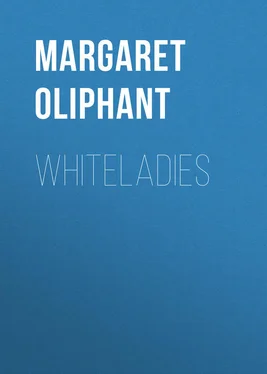Margaret Oliphant - Whiteladies
Здесь есть возможность читать онлайн «Margaret Oliphant - Whiteladies» — ознакомительный отрывок электронной книги совершенно бесплатно, а после прочтения отрывка купить полную версию. В некоторых случаях можно слушать аудио, скачать через торрент в формате fb2 и присутствует краткое содержание. ISBN: , Жанр: foreign_prose, на английском языке. Описание произведения, (предисловие) а так же отзывы посетителей доступны на портале библиотеки ЛибКат.
- Название:Whiteladies
- Автор:
- Жанр:
- Год:неизвестен
- ISBN:http://www.gutenberg.org/ebooks/52388
- Рейтинг книги:5 / 5. Голосов: 1
-
Избранное:Добавить в избранное
- Отзывы:
-
Ваша оценка:
- 100
- 1
- 2
- 3
- 4
- 5
Whiteladies: краткое содержание, описание и аннотация
Предлагаем к чтению аннотацию, описание, краткое содержание или предисловие (зависит от того, что написал сам автор книги «Whiteladies»). Если вы не нашли необходимую информацию о книге — напишите в комментариях, мы постараемся отыскать её.
Whiteladies — читать онлайн ознакомительный отрывок
Ниже представлен текст книги, разбитый по страницам. Система сохранения места последней прочитанной страницы, позволяет с удобством читать онлайн бесплатно книгу «Whiteladies», без необходимости каждый раз заново искать на чём Вы остановились. Поставьте закладку, и сможете в любой момент перейти на страницу, на которой закончили чтение.
Интервал:
Закладка:
“Oui, mon amie,” said M. Austin, “pour casser l’affaire – le contrat que nous avons fait, vous et moi, et que d’ailleurs n’a jamais été exécuté; c’est sa; I shall write, and madame will explique, and all will be made as at first. The gentleman was kind. I should never have known my rights, nor anything about the beautiful house that belongs to us – ”
“That may belong to you, on my poor boy’s death,” said Miss Susan, correcting him.
“Assuredly; after the death of M. le propriétaire actuel. Yes, yes, that is understood. Madame will explain to ce monsieur how the situation has changed, and how the contract is at least suspended in the meantime.”
“Until the event,” said Miss Susan.
“Until the event, assuredly,” said M. Austin, rubbing his hands.
“Until the event,” said Madame Austin, recovering herself under this discussion of details. “But it will be wise to treat ce monsieur with much gentleness,” she added; “he must be ménagé; for figure to yourself that it might be a girl, and he might no longer wish to pay the money proposed, mon ami. He must be managed with great care. Perhaps if I were myself to go to England to see this monsieur – ”
“Mon ange! it would fatigue you to death.”
“It is true; and then a country so strange – a cuisine abominable. But I should not hesitate to sacrifice myself, as you well know, Guillaume, were it necessary. Write then, and we will see by his reply if he is angry, and I can go afterward if it is needful.”
“And madame, who is so kind, who has so much bounty for us,” said the old man, “madame will explain.”
Once more the two women looked at each other. They had been so cordial yesterday, why were not they cordial to-day?
“How is it that madame has so much bounty for us?” said the old Flemish woman, half aside. “She has no doubt her own reasons?”
“The house has been mine all my life,” said Miss Susan, boldly. “I think perhaps, if you get it, you will let me live there till I die. And Farrel-Austin is a bad man,” she added with vehemence; “he has done us bitter wrong. I would do anything in the world rather than let him have Whiteladies. I thought I had told you this yesterday. Do you understand me now?”
“I begin to comprehend,” said Madame Austin, under her breath.
Finally this was the compact that was made between them. The Austins themselves were to write, repudiating their bargain with Farrel, or at least suspending it, to await an event, of the likelihood of which they were not aware at the time they had consented to his terms; and Miss Susan was to see him, and smooth all down and make him understand. Nothing could be decided till the event. It might be a mere postponement – it might turn out in no way harmful to Farrel, only an inconvenience. Miss Susan was no longer excited, nor so comfortable in her mind as yesterday. The full cup had evaporated, so to speak, and shrunk; it was no longer running over. One or two indications of a more miserable consciousness had come to her. She had read the shame of guilt and its irritation in her confederate’s eyes; she had felt the pain of deceiving an unsuspecting person. These were new sensations, and they were not pleasant; nor was her brief parting interview with Madame Austin pleasant. She had not felt, in the first fervor of temptation, any dislike to the close contact which was necessary with that homely person, or the perfect equality which was necessary between her and her fellow-conspirator; but to-day Miss Susan did feel this, and shrank. She grew impatient of the old woman’s brusque manner, and her look of reproach. “As if she were any better than me,” said poor Miss Susan to herself. Alas! into what moral depths the proud Englishwoman must have fallen who could compare herself with Madame Austin! And when she took leave of her, and Madame Austin, recovering her spirits, breathed some confidential details – half jocular, and altogether familiar, with a breath smelling of garlic – into Miss Susan’s ear, she fell back, with a mixture of disdain and disgust which it was almost impossible to conceal. She walked back to the hotel this time without any inclination to linger, and gave orders to Jane to prepare at once for the home journey. The only thing that did her any good, in the painful tumult of feeling which had succeeded her excitement, was a glimpse which she caught in passing into the same lofty common room in which she had first seen the Austin family. The son’s widow still sat a gloomy shadow in her chair in the corner; but in the full light of the window, in the big easy chair which Madame Austin had filled yesterday, sat the daughter of the house with her child on her lap, leaning back and holding up the plump baby with pretty outstretched arms. Whatever share she might have in the plot was involuntary. She was a fair-haired, round-faced Flemish girl, innocent and merry. She held up her child in her pretty round sturdy arms, and chirruped and talked nonsense to it in a language of which Miss Austin knew not a word. She stopped and looked a moment at this pretty picture, then turned quickly, and went away. After all, the plot was all in embryo as yet. Though evil was meant, Providence was still the arbiter, and good and evil alike must turn upon the event.
CHAPTER IX
“DON’T you think he is better, mamma – a little better to-day?”
“Ah, mon Dieu, what can I say, Reine? To be a little better in his state is often to be worst of all. You have not seen so much as I have. Often, very often, there is a gleam of the dying flame in the socket; there is an air of being well – almost well. What can I say? I have seen it like that. And they have all told us that he cannot live. Alas, alas, my poor boy!”
Madame de Mirfleur buried her face in her handkerchief as she spoke. She was seated in the little sitting-room of a little house in an Alpine valley, where they had brought the invalid when the Summer grew too hot for him on the shores of the Mediterranean. He himself had chosen the Kanderthal as his Summer quarters, and with the obstinacy of a sick man had clung to the notion. The valley was shut in by a circle of snowy peaks toward the east; white, dazzling mountain-tops, which yet looked small and homely and familiar in the shadow of the bigger Alps around. A little mountain stream ran through the valley, across which, at one point, clustered a knot of houses, with a homely inn in the midst. There were trout in the river, and the necessaries of life were to be had in the village, through which a constant stream of travellers passed during the Summer and Autumn, parties crossing the steep pass of the Gemmi, and individual tourists of more enterprising character fighting their way from this favorable centre into various unknown recesses of the hills. Behind the chalet a waterfall kept up a continual murmur, giving utterance, as it seemed, to the very silence cf the mountains. The scent of pine-woods was in the air; to the west the glory of the sunset shone over a long broken stretch of valley, uneven moorland interspersed with clumps of wood. To be so little out of the way – nay, indeed, to be in the way – of the Summer traveller, it was singularly wild and quaint and fresh. Indeed, for one thing, no tourist ever stayed there except for food and rest, for there was nothing to attract any one in the plain, little secluded village, with only its circle of snowy peaks above its trout-stream, and its sunsets, to catch any fanciful eye. Sometimes, however, a fanciful eye was caught by these charms, as in the case of poor Herbert Austin, who had been brought here to die. He lay in the little room which communicated with this sitting-room, in a small wooden chamber opening upon a balcony, from which you could watch the sun setting over the Kanderthal, and the moon rising over the snow-white glory of the Dolden-horn, almost at the same moment. The chalet belonged to the inn, and was connected with it by a covered passage. The Summer was at its height, and still poor Herbert lingered, though M. de Mirfleur, in pleasant Normandy, grew a little weary of the long time his wife’s son took in dying; and Madame de Mirfleur herself, as jealous Reine would think sometimes, in spite of herself grew weary too, thinking of her second family at home, and the husband whom Reine had always felt to be an offence. The mother and sister who were thus watching over Herbert’s last moments were not so united in their grief and pious duties as might have been supposed. Generally it is the mother whose whole heart is absorbed in such watching, and the young sister who is to be pardoned if sometimes, in the sadness of the shadow that precedes death, her young mind should wander back to life and its warmer interests with a longing which makes her feel guilty. But in this case these positions were reversed. It was the mother who longed involuntarily for the life she had left behind her, and whose heart reverted wistfully to something brighter and more hopeful, to other interests and loves as strong, if not stronger, than that she felt in and for her eldest son. When it is the other way the sad mother pardons her child for a wandering imagination; but the sad child, jealous and miserable, does not forgive the mother, who has so much to fall back upon. Reine had never been able to forgive her mother’s marriage. She never named her by her new name without a thrill of irritation. Her stepfather seemed a standing shame to her, and every new brother and sister who came into the world was a new offence against Reine’s delicacy. She had been glad, very glad, of Madame de Mirfleur’s aid in transporting Herbert hither, and at first her mother’s society, apart from the new family, had been very sweet to the girl, who loved her, notwithstanding the fantastic sense of shame which possessed her, and her jealousy of all her new connections. But when Reine, quick-sighted with the sharpened vision of jealousy and wounded love, saw, or thought she saw, that her mother began to weary of the long vigil, that she began to wonder what her little ones were doing, and to talk of all the troubles of a long absence, her heart rose impatient in an agony of anger and shame and deep mortification. Weary of waiting for her son’s death – her eldest son, who ought to have been her only son – weary of those lingering moments which were now all that remained to Herbert! Reine, in the anguish of her own deep grief and pity and longing hold upon him, felt herself sometimes almost wild against her mother. She did so now, when Madame de Mirfleur, with a certain calm, though she was crying, shook her head and lamented that such gleams of betterness were often the precursors of the end. Reine did not weep when her mother buried her face in her delicate perfumed handkerchief. She said to herself fiercely, “Mamma likes to think so; she wants to get rid of us, and get back to those others,” and looked at her with eyes which shone hot and dry, with a flushed cheek and clenched hands. It was all she could do to restrain herself, to keep from saying something which good sense and good taste, and a lingering natural affection, alike made her feel that she must not say. Reine was one of those curious creatures in whom two races mingle. She had the Austin blue eyes, but with a light in them such as no Austin had before; but she had the dark-brown hair, smooth and silky, of her French mother, and something of the piquancy of feature, the little petulant nose, the mobile countenance of the more vivacious blood. Her figure was like a fairy’s, little and slight; her movements, both of mind and body, rapid as the stirrings of a bird; she went from one mood to another instantaneously, which was not the habit of her father’s deliberate race. Miss Susan thought her all French – Madame de Mirfleur all English; and indeed both with some reason – for when in England this perverse girl was full of enthusiasm for everything that belonged to her mother’s country, and when in France was the most prejudiced and narrow-minded of English women. Youth is always perverse, more or less, and there was a double share of its fanciful self-will and changeableness in Reine, whose circumstances were so peculiar and her temptations so many. She was so rent asunder by love and grief, by a kind of adoration for her dying brother, the only being in the world who belonged exclusively to herself, and jealous suspicion that he did not get his due from others, that her petulance was very comprehensible. She waited till Madame de Mirfleur came out of her handkerchief, still with hot and dry and glittering eyes.
Читать дальшеИнтервал:
Закладка:
Похожие книги на «Whiteladies»
Представляем Вашему вниманию похожие книги на «Whiteladies» списком для выбора. Мы отобрали схожую по названию и смыслу литературу в надежде предоставить читателям больше вариантов отыскать новые, интересные, ещё непрочитанные произведения.
Обсуждение, отзывы о книге «Whiteladies» и просто собственные мнения читателей. Оставьте ваши комментарии, напишите, что Вы думаете о произведении, его смысле или главных героях. Укажите что конкретно понравилось, а что нет, и почему Вы так считаете.












